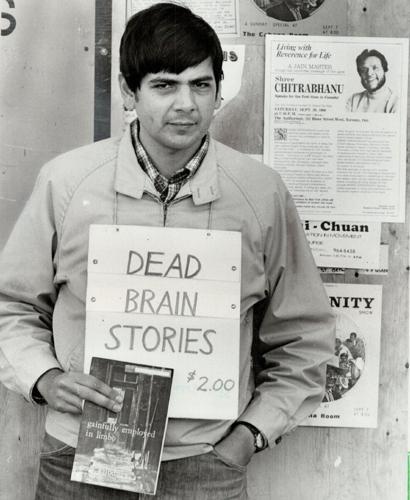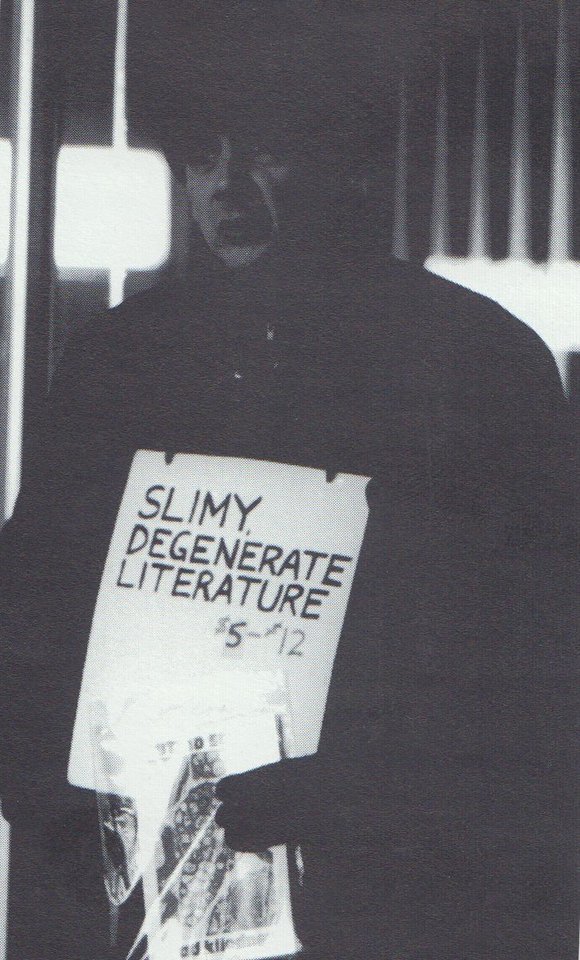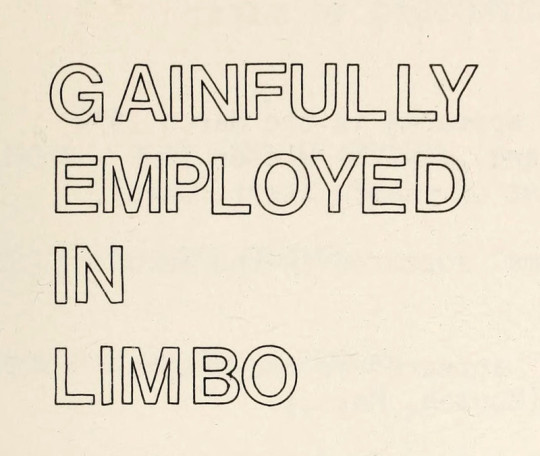#crad kilodney
Text
Middlemen without enshittification
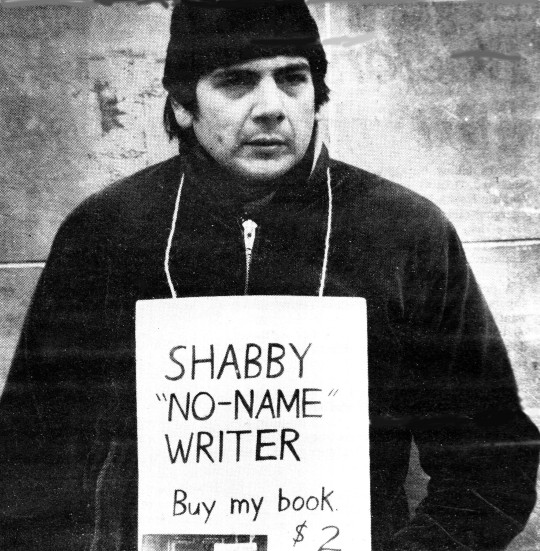
I'm on tour with my new novel The Bezzle! Catch me next in SALT LAKE CITY (Feb 21, Weller Book Works) and SAN DIEGO (Feb 22, Mysterious Galaxy). After that, it's LA, Seattle, Portland, Phoenix and more!

Enshittification describes how platforms go bad, which is also how the internet goes bad, because the internet is made of platforms, which is weird, because platforms are intermediaries and we were promised that the internet would disintermediate the world:
https://pluralistic.net/2024/01/30/go-nuts-meine-kerle/#ich-bin-ein-bratapfel
The internet did disintermediate a hell of a lot of intermediaries – that is, "middlemen" – but then it created a bunch more of these middlemen, who coalesced into a handful of gatekeepers, or as the EU calls them "VLOPs" (Very Large Online Platforms, the most EU acronym ever).
Which raises two questions: first, why did so many of us end up flocking to these intermediaries' sites, and how did those sites end up with so much power?
To answer the first question, I want you to consider one of my favorite authors: Crad Kilodney (RIP):
https://archive.org/details/thecradkilodneypapers
When I was growing up, Crad was a fixture on the streets of Toronto. All through the day and late into the evening, winter or summer, Crad would stand on the street with a sign around his neck ("Very famous Canadian author, buy my books, $2" or sometimes just "Margaret Atwood, buy my books, $2"). He wrote these deeply weird, often very funny short stories, which he edited, typeset, printed, bound and sold himself, one at a time, to people who approached him on the street.
I had a lot of conversations with Crad – as an aspiring writer, I was endlessly fascinated by him and his books. He was funny, acerbic – and sneaky. Crad wore a wire: he kept a hidden tape recorder rolling in his coat and he secretly recorded conversations with people like me, and then released a series of home-duplicated tapes of the weirdest and funniest ones:
https://archive.org/details/on-the-street-crad-kilodney-vol-1
I love Crad. He deserves more recognition. There's an on-again/off-again documentary about his life and work that I hope gets made some day:
https://pluralistic.net/2020/09/09/free-sample/#putrid-scum
But – and this is the crucial part – there are writers out there I want to hear from who couldn't do what Crad did. Maybe they can write books, but not edit them. Or edit them, but not typeset them. Or typeset, but not print. Or print, but not spend the rest of their lives standing on a street-corner with a "PUTRID SCUM" sign around their neck.
Which is fine. That's why we have intermediaries. I like booksellers (I was one!). I like publishers. I like distributors. I like their salesforce, who go forth and convince the booksellers of the world to stock books like mine. I have ten million things I want to do before I die, and I'm already 52, and being a sales-rep for a publisher isn't on my bucket list. I am so thankful that someone else wants to do this for me.
That's why we have intermediaries, and why disintermediation always leads to some degree of re-intermediation. There's a lot of explicit and implicit knowledge and specialized skill required to connect buyers and sellers, creators and audiences, and other sides of two-sided markets. Some producers can do some of this stuff for themselves, and a very few – like Crad – can do it all, but most of us need some help, somewhere along the way. In the excellent 2022 book Direct, Kathryn Judge lays out a clear case for all the good that middlemen can do:
https://pluralistic.net/2022/06/12/direct-the-problem-of-middlemen/
So why were we all so anxious for disintermediation back in the late 1990s? Here's a hint: it wasn't because we hated intermediaries – it was because we hated powerful intermediaries.
The point of an intermediary is to serve as a conduit between producers and consumers, buyers and sellers, audiences and creators. When an intermediary gains power over the audience – say, by locking them inside a walled garden – and then uses that lock-in to screw producers and appropriate an ever larger share of the value going between them, that's when intermediaries become a problem.
The problem isn't that someone will handle ticketing for your gig. The problem is that Ticketmaster has locked down all the ticketing, and the venues, and the promotions, and it uses that power to gouge fans and rip off artists:
https://pluralistic.net/2022/11/20/anything-that-cant-go-on-forever-will-eventually-stop/
The problem isn't that there's a well-made website that lets you shop for goods sold by many small merchants and producers. It's that Amazon has cornered this market, takes $0.51 out of every dollar you spend there, and clones and destroys any small merchant who succeeds on the platform:
https://pluralistic.net/2023/04/25/greedflation/#commissar-bezos
The problem isn't that there's a website where you can stream most of the music ever recorded. It's that Spotify colludes with the Big Three labels to rip off artists and sneaks crap you don't want to hear into your stream in order to collect payola:
https://pluralistic.net/2022/09/12/streaming-doesnt-pay/#stunt-publishing
The problem isn't that there's a website where you can buy any audiobook you want. It's that Amazon's Audible locks every book to its platform forever and steals hundreds of millions of dollars from creators:
https://pluralistic.net/2022/07/25/can-you-hear-me-now/#acx-ripoff
The problem, in other words, isn't intermediation – it's power. The thing that distinguishes a useful intermediary from an enshittified bully is power. Intermediaries gain power when our governments stop enforcing competition law. This lets intermediaries buy each other up and corner markets. Once they've formed cozy cartels, they can capture their regulators and commit rampant labor, privacy and consumer violations with impunity. That capture also lets them harness governments to punish smaller players that want to free workers, creators, audiences and customers from walled gardens. It also hands them a whip-hand over their workers, so that any worker who refuses to aid in these nefarious plans can be easily fired:
https://pluralistic.net/2024/01/30/go-nuts-meine-kerle/#ich-bin-ein-bratapfel
A world with intermediaries is a better world. As much as I love Crad Kilodney's books, I wouldn't want to live in a world where the only books on my shelves came from people prepared to stand on a street-corner wearing a "FOUL PUS FROM DEAD DOGS" sign.
The problem isn't intermediaries – it's powerful intermediaries. That's why the world's surging antitrust movement is so exciting: by reinstating competition law, we can keep intermediaries small and comparatively weak, so that creators and audiences, drivers and riders, sellers and buyers, and other groups seeking to connect will not find themselves made subservient to middlemen.

If you'd like an essay-formatted version of this post to read or share, here's a link to it on pluralistic.net, my surveillance-free, ad-free, tracker-free blog:
https://pluralistic.net/2024/02/19/crad-kilodney-was-an-outlier/#intermediation
#pluralistic#intermediation#disintermediation#publishing#creative labor#middlemen#distributors#publishers#publicists#enshittification#monopoly#monopsony#crad kilodney#trustbusting#antitrust
171 notes
·
View notes
Text
Street Meat Stories
Writing and whoring—selling a body or a body of work—what’s the difference?

by Andrea Werhun and Nicole Bazuin
“All these girls have to wait for is a man with $70 and an itchy cock. I have to wait for someone with $3 who reads literature.”
—Crad Kilodney, Excrement (1988)
Writing and whoring—selling a body or a body of work—what’s the difference?
Toronto, December 1983. Crad Kilodney, the legendary self-described “failed writer,” is selling his self-published book, Terminal Ward, from a vacant storefront on the Yonge Street strip, somewhere between Gerrard and Dundas. Hanging from his neck each day is a handwritten sign, and today’s placard reads, “Pleasant Bedtime Reading.”
Other notable signs include “Books for Clueless Twits” and “Literature for Mindless Blobs.” In his memoir, Excrement, Crad writes, “I choose my most provocative or insulting signs to wear when I’m in my most aggressive moods because deep down I want to strangle these people.”
This—writing and selling his wares in the street, getting accosted by drunks, ignored by the masses, and making very few sales—is his full-time job. Crad comes back every day to sell his books, published by his personal imprint, Charnel House. By the end of his life, he’ll have written more than thirty books, and spent seventeen years selling them out on the street.
Like writing, sex work is a game of endurance. Whether in the club or on the street, scribbling in a journal or revising the last draft of a manuscript, the writer and the whore must learn to “stick it out” and be patient with the process.
READ MORE
#authors#writers#writing#writer problems#booksellers#book publishers#indie press#librarians#writerslife#female writers
5 notes
·
View notes
Link
0 notes
Photo

Famous Canadian Authors Series
0 notes
Photo
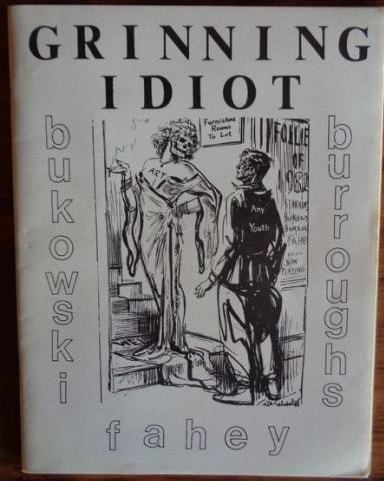
"Grinning Idiot is an underground literary magazine. Pub. 1982. 8 1/2" by 11" Illustrated stapled wrappers. Conceived and designed by Jerry Weinberger, Prose Editor and Barry Levy, Poetry Editor. With cover art by Keith Angier, original, works by: Charles Bukowski, William S. Burroughs, Harvey Pekar, Crad Kilodney, John Clellon Holmes, S. Clay Wilson, Terry Berkson, Richard Grayson, John Fahey, etc."
https://www.amazon.com/Grinning-Idiot/dp/B008T06FPM/ref=cm_cr_arp_d_pl_foot_top
2 notes
·
View notes
Text
The Bezzle excerpt (Part III)

I'm on tour with my new novel The Bezzle! Catch me TOMORROW in SALT LAKE CITY (Feb 21, Weller Book Works) and then SAN DIEGO (Feb 22, Mysterious Galaxy). After that, it's LA, Seattle, Portland, Phoenix and more!

This week, I'm serializing part of chapter 14 from my new novel The Bezzle, which is out in stores TODAY (!!!):
https://us.macmillan.com/books/9781250865878/thebezzle
The Bezzle is a Martin Hench novel, the followup to last year's Red Team Blues – though each book in the series is designed to be read in any order, and to stand alone (RTB just came out in paperback):
https://us.macmillan.com/books/9781250865854/redteamblues
Hench is a two-fisted, high-tech forensic accountant whose career spans 40 years of busting high-tech scams, from the earliest days of the PC to the white-hot center of the cryptocurrency bubble. Each book revolves around a single, central scam (in The Bezzle, it's the unbelievably slimy prison-tech industry):
https://pluralistic.net/2024/02/14/minnesota-nice/#shitty-technology-adoption-curve
But each book also features lots of subplots that unpick different kinds of fraud. In this serialized excerpt, we get to watch Marty unwind a music royalty theft scheme, the kind of thing that Rebecca Giblin and I pulled apart in our 2022 book, Chokepoint Capitalism (also now in paperback!):
https://chokepointcapitalism.com/
Today's installment gets into one of the major tactics of any semi-respectable scam – simply ignoring the victim in the hope that they'll get tired and go away. Any of us who've been ripped off by a big company can surely relate.
I'm leaving on my tour for this one tomorrow, starting with a gig in Salt Lake City at Weller Bookworks (Feb 21) at 630PM:
https://www.wellerbookworks.com/event/store-cory-doctorow-feb-21-630-pm
From there, it's on to LA (with Adam Conover), Seattle (with Neal Stephenson) and many, many more cities – maybe one near you!
https://pluralistic.net/2024/02/16/narrative-capitalism/#bezzle-tour
Here's part one of the serial:
https://pluralistic.net/2024/02/17/the-steve-soul-caper/#lead-singer-disease
And part two:
https://pluralistic.net/2024/02/19/crad-kilodney-was-an-outlier/#copyright-termination
And now, onto part three!

Stefon cooked Jamal another dinner and Jamal wrote another letter, this one more forceful, and addressed to Gounder by name. Two weeks later, Jamal wrote another letter without needing dinner because “that motherfucker went to Harvard fucking law”—Jamal had looked him up in the ALA directory—“and he knows you can’t make legal problems go away just by ignoring them. Time for that piece of shit to put on his big-boy pants and be a goddamned lawyer.”
The one thing Jamal wouldn’t do was file a lawsuit. “You need a lawyer for that,” he said. “I mean, I can help you with the paperwork, but a paralegal can’t file the suit. And you shouldn’t file your own suit, either. Those guys’ll just hire some blow-dried asshole from a big law firm and they’ll crush you like a cockroach.”
“Well, shit,” Stefon said. But it all made sense. Anyone doing business with Chuy Flores would do business like Chuy Flores—that is, crooked as hell.
“What you need is a contingency lawyer,” Jamal said. “Someone who’ll take the job for a piece of the action.” Which is how Stefon ended up being represented by Benny Caetani II, son of Benedetto Caetani, who graduated at the top of his Yale class, won a string of spectacular class-action suits, then got disbarred after someone leaked calls where he admitted moving money from one client trust account into another to cover a shortfall. No one seriously thought that Benedetto was stealing anyone’s money—he’d had receivables due within a week that let him make the trust account whole—but he was also clearly guilty.
Equally, no one seriously believed that the high-powered surveillance that led to Benedetto’s downfall was random. Benedetto had transferred more than a hundred million dollars from the balance sheets of America’s largest, dirtiest corporations— poison-peddling pharma giants, toxic-waste-dumping chemical companies, a global chain of botox parlors with some very loose syringes indeed—and they were gunning for him.
Officially, Benedetto was out of the lawyer game. Unofficially, he was the brains behind Benny, and the two of them ran a squeaky-clean shop, making sure that everything that an actual lawyer had to do, Benny did—while Benedetto did everything else. Father and son got along well and they were a hell of a team. When Benedetto called me in to audit Inglewood Jams’ books, I jumped at the opportunity. They were a delight to work for.
“They played tough,” Benedetto said, as his minions arranged the bankers’ boxes on the steel kitchen shelves he’d had installed on the long walls of the storefront he’d rented for me to work out of for the month. “At first. Told me they didn’t owe Stefon a dime, and that they’d rather bankrupt themselves in court than pay some broken-down, washed-up disco king anything. Told me his problem was with Chuy, not Inglewood Jams.”
“Well, to be fair, that Chuy guy sounds like a class-A piece of shit.”
“A broke piece of shit. Guy’s got a million-dollar nose and an empty bank account.”
“So you had to go after Inglewood Jams.”
Benedetto twirled around in his Aeron chair. He’d sent over a pair of them, asking if I needed more, because he had a storage locker full of them that he’d gotten as part of a settlement with a broke Santa Monica crowdsourcing company that stiffed its workers when it folded.
“I did. I went after them. That Gounder lawyer tried to bluff, then when that didn’t work, he tried to dodge service. Which was such a kindergarten move. Plus he was no good at it. Caught him outside the rub-and-tug parlor he went to every Friday after work. Handed him the papers. Wore a bodycam. Didn’t mention his wife. Didn’t have to.”
“You think he settled because he didn’t want his wife to find out he was getting hand jobs at a massage parlor?”
“No, he held out awhile after that. But I could see it preying on him, every time I was face-to-face with him. Eventually, he musta told his bosses that they were gonna lose, and so they offered a settlement. It was trash. I laughed in his face. He tossed out some better offers, but none of them even in the ballpark of what we would get in court. Finally, I told him to get serious or send his court suit out to the dry cleaner’s. That’s when he offered to make Stefon whole and pay me a little for my trouble on top of things.”
I suppressed a snort. I was sure that a little on top amounted to some real folding money.
“Even then he tried to pull a fast one, told me he’d calculate Stefon’s royalties and send a check the next week. I was like, ‘Hold up, there is no way you’re going to be able to make an honest accounting for Stefon’s royalties in a week. The dude’s samples are in hundreds of songs. The mere fact that you claimed that you could come up with a fair amount in a week tells me you were planning to pull a lowball number out of your ass and pass it off as the audited total, so tell you what, I’m gonna get the best forensic accountant in the state of California to come down here to LA and crawl all over your papers, and you are going to send him everything he needs to do it, or we’re going to court, motherfucker.”
“And he agreed?”
“Hell no. He refused. We went to a preliminary hearing. Judge turned out to be a classic soul fan. It didn’t go well for Gounder or Inglewood. The next day, he was back in my office, and now, well, here we are.”
ETA: Here's part four!

If you'd like an essay-formatted version of this post to read or share, here's a link to it on pluralistic.net, my surveillance-free, ad-free, tracker-free blog:
https://pluralistic.net/2024/02/20/fore/#lawyer-up
#pluralistic#the bezzle#martin hench#marty hench#red team blues#fiction#crime fiction#crime thrillers#thrillers#technothrillers#novels#books#royalties#wage theft#creative labor
10 notes
·
View notes
Text
0 notes
